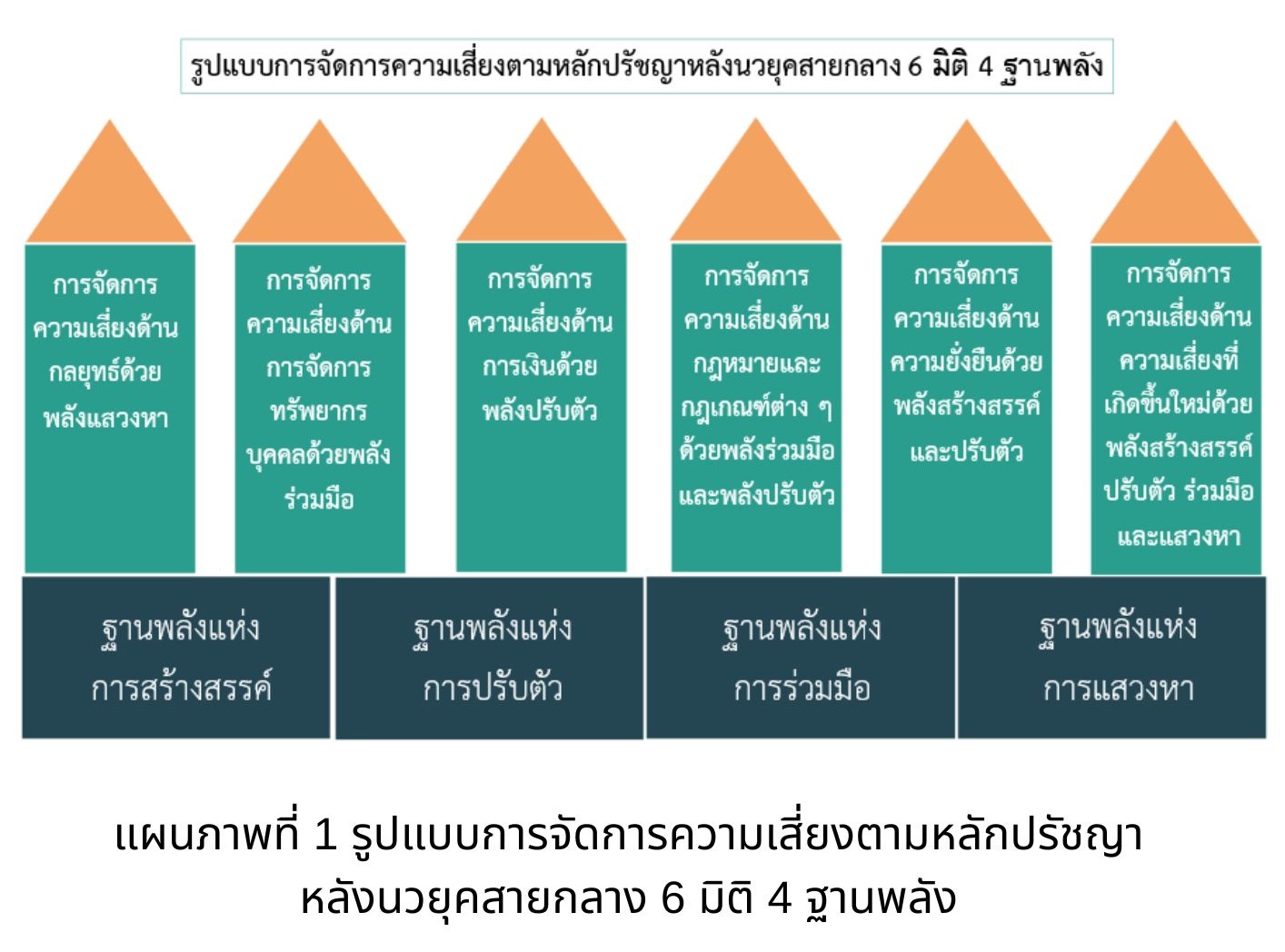การจัดการความเสี่ยงท่ามกลางความเปลี่ยนแปลงตามหลักปรัชญาหลังนวยุคสายกลาง
คำสำคัญ:
ความเสี่ยง, การจัดการ, การจัดการความเสี่ยง, การเปลี่ยนแปลง, ปรัชญาหลังนวยุคสายกลางบทคัดย่อ
บทความวิจัยฉบับนี้ เป็นการวิจัยเชิงคุณภาพโดยการวิเคราะห์เอกสาร มีวัตถุประสงค์เพื่อวิเคราะห์การจัดการความเสี่ยงตามหลักปรัชญาหลังนวยุคสายกลาง ผลการวิจัย พบว่า การจัดการความเสี่ยงตามหลักปรัชญาหลังนวยุคสายกลาง ใช้หลักพลัง 4 เป็นพื้นฐานหรือหลักการในการจัดการความเสี่ยง ได้แก่ พลังสร้างสรรค์ พลังปรับตัว พลังร่วมมือ และพลังแสวงหา ดังนี้ 1. การจัดการความเสี่ยงตามหลักปรัชญาหลังนวยุคสายกลางด้วยพลังสร้างสรรค์ เป็นการจัดการความเสี่ยงที่เกิดจากการวางกลยุทธ์อย่างสร้างสรรค์เพื่อให้เกิดการวิเคราะห์ ประเมินค่า และประยุกต์ใช้ได้ในทุกระดับองค์กรด้วยกลยุทธ์ การสื่อสารมีประสิทธิภาพ 2. การจัดการความเสี่ยงตามหลักปรัชญาหลังนวยุคสายกลางด้วยพลังปรับตัว เป็นการจัดการความเสี่ยงที่เกิดจากการปรับตัวให้เข้ากับสิ่งแวดล้อม เมื่อมีการนำกลยุทธ์เชิงสร้างสรรค์ไปปฏิบัติ 3. การจัดการความเสี่ยงตามหลักปรัชญาหลังนวยุคสายกลางด้วยพลังร่วมมือ เป็นการจัดการความเสี่ยงโดยการประสานภายในองค์กรให้สอดคล้องกัน จนนำไปสู่ความรู้รักสามัคคีภายในองค์กร 4. การจัดการความเสี่ยงตามหลักปรัชญาหลังนวยุคสายกลางด้วยพลังแสวงหา เป็นการใช้พลังแสวงหาเพื่อขยายฐานลูกค้า หรือหากลุ่มลูกค้าใหม่ ๆ ที่ยังมีกำลังซื้อทั้งในประเทศและต่างประเทศ การแสวงหาช่องทางใหม่ ๆ ในการจำหน่ายสินค้าด้วยวิธีใหม่ ๆ เพื่ออำนวยความสะดวกให้แก่ลูกค้า ส่วนรูปแบบการจัดการความเสี่ยงตามหลักปรัชญาหลังนวยุคสายกลางประกอบด้วย 6 มิติ โดยวางอยู่บน 4 ฐานพลัง ได้แก่ พลังสร้างสรรค์ พลังปรับตัว พลังร่วมมือ และพลังแสวงหา อันเป็นหลักการสำหรับนำมาประยุกต์ใช้ให้เหมาะกับบริบทของการจัดการความเสี่ยงในแต่ละมิติหรือแต่ละด้าน ได้แก่ 1) การจัดการความเสี่ยงด้านกลยุทธ์ด้วยพลังแสวงหา 2) การจัดการความเสี่ยงด้านการจัดการทรัพยากรบุคคลด้วยพลังร่วมมือ 3) การจัดการความเสี่ยงด้านการเงินด้วยพลังปรับตัว 4) การจัดการความเสี่ยงด้านกฎหมายและกฎเกณฑ์ต่าง ๆ ด้วยพลังร่วมมือและพลังปรับตัว 5) การจัดการความเสี่ยงด้านความยั่งยืนด้วยพลังสร้างสรรค์และปรับตัว และ 6) การจัดการความเสี่ยงด้านความเสี่ยงที่เกิดขึ้นใหม่ด้วยพลังสร้างสรรค์ ปรับตัว ร่วมมือ และแสวงหา
เอกสารอ้างอิง
จตุรภัทร วงศ์สิริสถาพร. (2561). การบริหารความเสี่ยงแบบบูรณาการที่มีต่อผลการดำเนินงานขององค์กร : หลักฐานเชิงประจักษ์บริษัทจดทะเบียนในตลาดหลักทรัพย์แห่งประเทศไทย. วารสารสาขามนุษยศาสตร์ สังคมศาสตร์ และศิลปะ, 11(3), 3,279-3,300.
ชลพรรฒน์ เคียนทอง, ภิรดา ชัยรัตน์ และ เกวลิน ศีลพิพัฒน์. (2565). ความสัมพันธ์ระหว่างการบริหารการเปลี่ยนแปลงกับการเป็นองค์กร 4.0 ของกองบังคับการตำรวจจราจร. วารสารวิชาการและวิจัยสังคมศาสตร์, 17(3), 143-156.
ทิพวรรณ กลั่นปรีชา. (2563). “ความสัมพันธ์ของการบริหารความเสี่ยงด้านการคลังและประสิทธิภาพการเบิกจ่ายเงินของกรมควบคุมโรค สังกัดกระทรวงสาธารณสุข”. บัญชีมหาบัณฑิต. วิทยาลัยบริหารธุรกิจนวัตกรรมและการบัญชี : มหาวิทยาลัยธุรกิจบัณฑิต.
พอรุ้ง แสงนวล. (2563). การบริหารความเสี่ยงกับประสิทธิผลของโรงเรียน สังกัดสำนักงานเขตพื้นที่การศึกษามัธยมศึกษาเขต 9. ศึกษาศาสตรมหาบัณฑิต. บัณฑิตวิทยาลัย : มหาวิทยาลัยศิลปากร.
ล่องใต้ ไทยแลนด์. การศึกษาตามหลักปรัชญาหลังนวยุคสายกลาง : วิเคราะห์จากหลักการทรงงานของพระบาทสมเด็จพระบรมชนกาธิเบศร มหาภูมิพลอดุลยเดชมหาราช บรมนาถบพิตร (ตอนที่ 2). [ออนไลน์]. แหล่งที่มา : https://www.longtaithailand.com/news/detail/7128 [12 เมษายน 2567]
สิริกร อมฤตวาริน และเอนก สุวรรณบัณฑิต. (2565). สุนทรียสนทนา: เครื่องมือของกระบวนทรรศน์หลังนวยุคสายกลาง. วารสารวิจัยธรรมศึกษา, 5(1), 152-161.
Hiatt, J. (2006). ADKAR : a model for change in business, government, and our community. Colorado : Prosci Research.
Joris, V. D. V. (2014). The effectiveness and specificity of change management in a public organization : Transformational leadership and a bureaucratic organizational structure. Elsevier Ltd, 32(1), 373–382.

ดาวน์โหลด
เผยแพร่แล้ว
รูปแบบการอ้างอิง
ฉบับ
ประเภทบทความ
สัญญาอนุญาต
ลิขสิทธิ์ (c) 2024 วารสารสถาบันพอดี

อนุญาตภายใต้เงื่อนไข Creative Commons Attribution-NonCommercial-NoDerivatives 4.0 International License.



